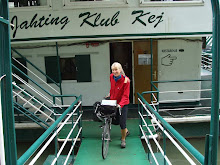
Met on Earl Street, Dublin
November 28 to December 5, 2008
While we were in Saranda, Albania, our perpetual traveler friend Bobby had introduced us to the websites of no-frills airlines such as Ryanair and Easyjet, and we had made a rare advance booking for a Ryanair flight from Venice to Dublin on November 28. Ireland in December? Craziness, you might have thought, and why would people from Vancouver choose a cold and rain-soaked isle? For Dan it was part of his heritage tour (he claims to have Ukrainian and Irish descent, although I believe he’s a Romanian gypsy); and music is a draw for both of us. However, against all expectations our sojourn in Ireland was mostly under clear skies. We spent a couple of days in Dublin, and then took off in a little rental car for a whirlwind tour of the island.
What astounding colours! Emerald carpets, luminous in the low December sun, rolled down the hillsides either side of our road; white houses dotted the green. Around the Ring of Kerry, shorn sheep with red paint on their rumps scrambled up the rocky golden hillsides away from our advancing Mercedes. (Two on the downhill side peered over the edge in uncertainty.) On a clear morning in the western seaside town of Lahinch, a lone wetsuited windsurfer stood ready on the promenade, and white spray hung over the crashing surf in the bay. In changeable weather, dark clouds hung over a sunlit white surf and green shores on another wide western bay.
The December days were short, but colours didn’t fade in the night. In Killarney, we walked into a pink sky toward Ross Castle. Stars poked holes of light in the darkening blue canopy of sky; winter trees reached their naked branches to meet it. Above the castle by the lake, a glow: the crescent moon with Venus attached to its underside. Later, in the warmth of a pub, Guinness in hand, the mellow dark brown of wood walls and tables shone in the light of the coal fire.
We had looked forward to the advantages of being in an English-speaking country, and were a bit surprised at the high proportion of people working in hostels and restaurants and pubs who were from other countries, come to partake of the success of the “Celtic Tiger.” Many of these foreigners are from EU countries (e.g., Poland, Netherlands, England), but Australia is also well-represented. At 8.65 euros ($14.85 CAD, compared to $8 CAD in British Columbia) the minimum wage is attractive, even taking into account the high cost of living, among the highest I’ve encountered on my recent travels. Ireland is succumbing, however, to the downward global economic trend, and this was very much on people’s minds.
Although many of the people we met, especially in the Republic of Ireland, were foreigners, we enjoyed the Irish gift of talk. The car radio was rather more entertaining than even beloved CBC as we sped along the coastal roads listening to people’s stories and issues. In Northern Ireland, a woman at the Museum of Free Derry talked to us about the “Troubles” and the events of Bloody Sunday, January 30, 1972, when 13 unarmed demonstrators, among them her brother, were shot and killed by British troops. She also showed us the huge rubber bullets, about five inches long, that were used in those days against rioters. But no one we met was more articulate in his passion for Irish unification and nationalism than Damien, a 27-year-old we met in a Belfast bar called Fibber Magee’s. Early in the evening, he was almost professorial in his answers to our questions; he was knowledgeable about any aspect of Irish history and folklore. As the empty Guinness pint glasses multiplied on the table, he got more personal. “I grew up in f*ing Bosnia,” he said, meaning Belfast, where he witnessed daily injustice and persecution, had his nose broken three times, and got so fed up that coming out of school he was “ready to join up” (the IRA). He “had to get out”: his grandfather, leader of regular all night family music sessions, especially worried about him. Whether he was sent or went of his own accord, he didn’t say, but he ended up at university in England. There he made friends and learned that the English “are people too.” Now he is a lawyer for the Queen’s Court, working inside the system for change. He appointed himself our Irish tutor for the night, teaching us Gaelic words, providing context for the Irish songs the band was playing, and singing along in my ear so I wouldn’t miss the words.
And sadly, the Irish tour ended there—but we’ll be back. Ireland’s heading the list for the next overseas cycling trip.










No comments:
Post a Comment